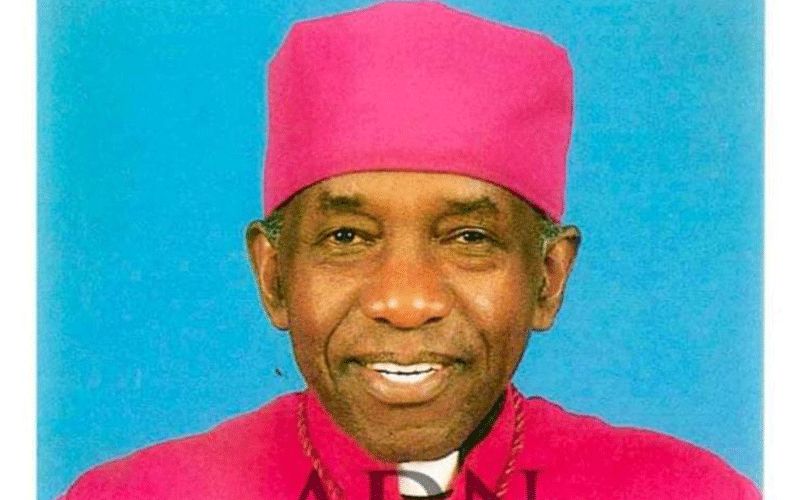People like the Servant of God Maurice Michael Cardinal Otunga, Fr. Gichure recalls, “were so touched by the situation on the ground that he felt he could not support the government in that respect.”
“The government would deny, and deny and deny. Journalists were not ready to write everything,” the Professor of Dogmatic Theology and Peace studies recalled in his interview with ACI Africa Tuesday, March 31.
Owing to Archbishop Ndingi’s critique of the President and his clamor for truth and justice, Fr. Gichure revealed, “The government was feeling very agitated by him because he seemed to be letting things out.”:
“His life was always in danger and one time we came back on a Sunday to find his house broken into and vandalized and of course the culprit was the government,” Fr. Gichure shared with ACI Africa, remembering the strategy of intimidation the government of the day employed to silence critics.
Fr. Gichure also described Archbishop Ndingi as a “seeker of truth” explaining, “For him, what was happening in the country was very important and he always wanted to know what was the truth.”
(Story continues below)
Since the Archbishop was always seen as a critic of the government, Fr. Gichure recalls, “he always made sure I read the papers and go out to seek out information on some things that were being said, verify and try to bring him the right information.”
To ensure that he always took on the government with the right information, the Archbishop had informers who Fr. Gichure reveals. “Would tell him what was happening at the grassroots.”
“Whenever he made a statement against the government or challenged the President, he always had his facts,” Fr. Gichure attested and added, “He always told me you don’t speak if you do not have the facts.”
Fr. Gichure who knew the late Archbishop since early 1970s also recalled the support he received from the late Archbishop while undergoing his formation to the priesthood saying, “When in the seminary he really supported me. At one time they wanted to expel me from the seminary and he came fighting for me. He said he could not allow an injustice to happen.”
“He is the one who took me to the seminary and ordained me on his Feast day on September 29, the Feast of the Archangels,” Fr. Gichure recalled, eulogizing the late Archbishop Raphael Ndingi as a father figure.
On his part, Fr. Anthony Mwituria who lived with the Archbishop Ndingi in his years of retirement and old age has described the late Prelate as a “great man of faith, prayerful,” and one “who stood for what was true because of his faith.”
Fr. Mwituria further told ACI Africa that the late Kenyan Prelate “was a humble man; he would listen and was always ready to change his opinion when circumstances dictated.”
“He was also very caring and supportive of people. He supported many people to pursue their studies and succeed in life. He helped many people from deserving backgrounds and was also involved in rehabilitating street children,” Fr. Mwituria, a lecturer and formator at Kenya’s St. Augustine Major Seminary, Mabanga told ACI Africa during the Tuesday, March 31 interview.
Meanwhile, Kenya’s President, Uhuru Kenyatta has, in his condolence message, eulogized Archbishop Ndingi as “a true servant of God who loved all people and served our country with great zeal and humility.”
Kenya’s Deputy President, William Ruto described the late Prelate as “a towering and progressive spiritual figure who relentlessly advocated for equal justice in our society.”
David Gicheha Twitted in reference to the late Archbishop, “He administered me one of the 7 Catholic sacraments-confirmation, condemned intolerance and helped affected families in 1992 Kenyan post elections skirmishes daring dictator leadership in the country.”
Born in Machakos diocese in eastern Kenya on Christmas Day 1931, Archbishop Ndingi was ordained a priest of Nairobi Archdiocese in January 1961. He served as Bishop of Machakos for a period of two years before he was transferred to Nakuru diocese where he served for 25 years.
He was appointed Coadjutor Archbishop of Nairobi in June 1996 and succeeded the Servant of God Maurice Cardinal Otunga as Archbishop in April 1997. He retired in October 2007.
In his biography published in 2009 under the title, “A Voice Unstilled,” Archbishop Ndingi is described as “one of the most preeminent Catholic figures in Kenya” who “played a crucial yet insufficiently appreciated role in some of the most momentous events in Kenya, including fighting for social justice, fighting for the African traditional values to be respected by the church's highest authorities in Rome and helping in the growth of education in the country.”








